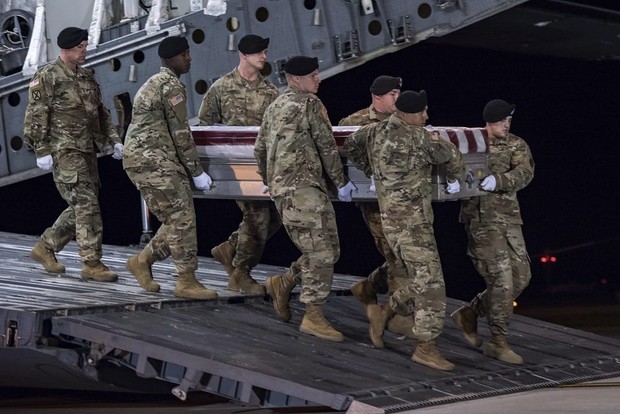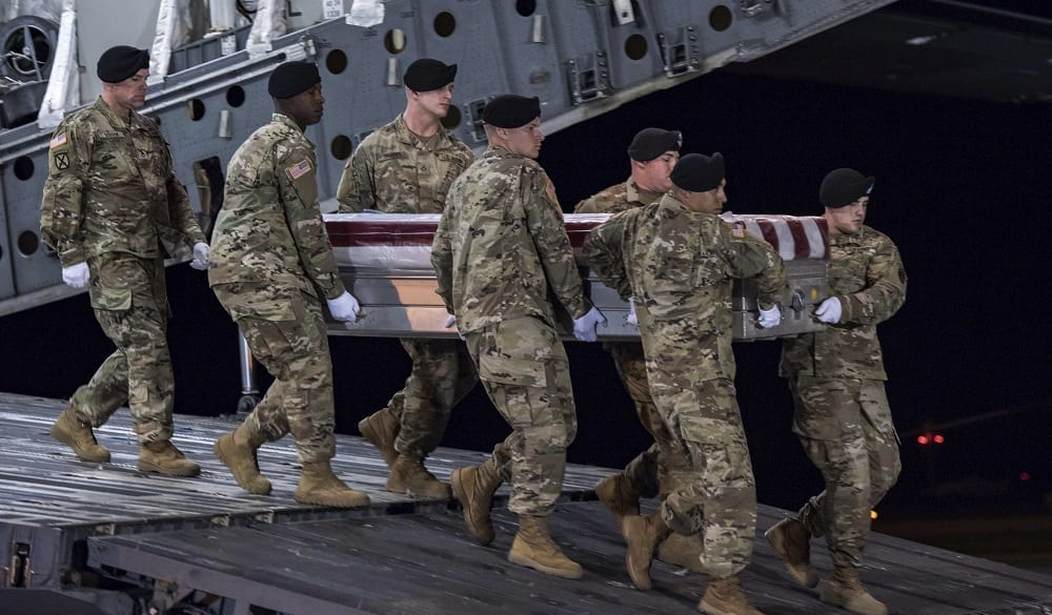
In this image provided by the U.S. Army, a carry team of soldiers from the 3d U.S. Infantry Regiment (The Old Guard), carry the transfer case during a casualty return for Staff Sgt. Dustin M. Wright, of Lyons, Ga., at Dover Air Force Base, Del., Oct. 5, 2017. U.S. and Niger forces were leaving a meeting with tribal leaders when they were ambushed on Oct. 4 and Wright and three other soldiers were killed. There were about a dozen U.S. troops and a company of Niger forces, for a total of about 40 service members in the joint mission. (Pfc. Lane Hiser/U.S. Army via AP)
The Vietnam War left the US Army in tatters. The pressure to achieve measurable results in a six-month command tour created an generation of senior officers who had cheated on body counts and obscured atrocities. As anyone who has served in a large organization will tell you, people hire in their own image. By the late 1970s, the US Army was flat on its ass. Young officers feared assignment to West Germany where discipline was scant and heroin abuse was rampant. Race relations were horrendous. Often units self-segregated into barracks areas that were assigned by race/ethnicity not by unit affiliation. Young soldiers joining a unit were frequently given an ultimatum to pay protection money to the appropriate racial gang. Shortly before I joined by battalion there was a cross-burning on the lawn of the NCO Club. Good NCOs had left the Army in droves and many of the ones remaining were substandard. I had one squad leader who was functionally illiterate. You quickly learned that all the stuff you’d been taught in your Basic Course about relying on your NCOs was bullsh** because a non trivial percentage of them were dangerous to everyone around them. The combination of careerism and lack of integrity at the top and incompetence at the bottom created officers who were micromanagers and who had learned the hard way to look out for Number One. In many units “if I can’t look good, I’ll make you look bad” was the SOP.
Anyway, the ship righted itself. Some very good men managed to rise to the top. Careerism was brought under control. Command tours were extended so that a commander had to live with the crap he created. At Leavenworth, Anton Meyer’s novel “Once an Eagle” was required reading. Military operations in Panama, in Desert Storm, in the invasion of Iraq showed that the US Army was the preeminent land power in the world. In Lebanon, Hezbollah recruiting billboards stopped featuring men in a keffiyeh and carrying an AK-47 and started portraying men in woodland pattern BDUs and carrying M-4 carbines. Why? For the same reason kids wear the jersey of the Super Bowl champions and not the Cleveland Browns.
Now I think the pendulum is swinging the other way. Not just in the Army, but in the Navy (the WestPac destroyers playing lethal bumper cars with cargo ships) and Air Force as well, but in the Army in particular.
On October 17, 2017, Nigerien troops advised by US Special Forces engaged in a confused action in western Niger.
What seems to happen is that at some point a routine reconnaissance patrol with civil affairs as its primary objective was repurposed into part of an attempt to take out a senior terrorist later. Nothing wrong with that. In tactical units flexibility is the byword. You have to learn how to adapt and you have to have the level of training and trust necessary to make rapid changes (well, Captain, we’re sorry that the American UH-60s scheduled for your unit were replaced with ROK Army UH-1s whose pilots had been briefed on completely different Landing Zones and who couldn’t speak English anyway. Carry out the mission or pack your sh** and get off the battlefield. That’s why you get paid the big bucks.).
The join US-Niger were caught in an ambush killing zone by a numerically superior enemy that seemed to know its business.
.https://twitter.com/DuffelBlog/status/544567806696906753
And things went pear-shaped, tits up, whatever you want to call it very fast.
Here is helmet-cam from the fight:
Because the meeting was executed without detailed planning, aka fragged, there was no aerial reconnaissance, there was no air support, there was no artillery, and the quick reaction force wasn’t all that quick or reactive, or much of a force.
Long story short, four Americans, three SOF troopers and one soldier supporting them, were killed. Then the search for scapegoats started.
Since the ambush, four-star general officers have done everything in their power to avoid taking any responsibility for their command’s failures. Instead, they push blame down to the lowest possible levels, desperately searching for scapegoats to deflect blame from their careers and systemic failures within the services. The solution is not to fault soldiers under fire, but to fix the universal problems in higher commands.
Army Command Policy states, “Commanders are responsible for everything their command does or fails to do. However, commanders subdivide responsibility and authority and assign portions of both to various subordinate commanders and staff members. In this way, a proper degree of responsibility becomes inherent in each command echelon. Commanders delegate sufficient authority to Soldiers in the chain of command to accomplish their assigned duties, and commanders may hold these Soldiers responsible for their actions. Commanders who assign responsibility and authority to their subordinates still retain the overall responsibility for the actions of their commands.”
At first, all the blame landed in the lap of the most expendable guy, Special Forces Michael Perozeni. He was accused of not preparing his unit for the mission and for misrepresenting the nature of the operation. When that report made its way to the desk of then Secretary of Defense James Mattis he blew a gasket. He set aside the reprimand administered to Perozeni and ordered a reinvestigation.
It is no surprise that former defense secretary James Mattis was the only man in the command structure to ask why senior leaders were not being held accountable. In December, The New York Times reported that he erupted in anger at generals and civilian leaders for only apportioning blame on the team leader.
The knee-jerk result was to rescind Perozeni’s reprimand and for the Army to reprimand the next-higher-level commander, Lt. Col. David Painter, who ultimately ordered the mission to go forward despite the pushback from the unit on the ground. Painter has now been removed from his next command, an Advise and Assist Battalion scheduled to deploy to Afghanistan, thus furthering the problem.
Let me say as a guy who commanded a rifle company and had more than his share of misadventures, I’m basically opposed to punishing people for taking actions (as opposed to not taking actions). The enemy always gets a vote in the outcome of a combat operation and if the standard is that if one of your soldiers gets killed your career is over, then it doesn’t take a genius to see that you aren’t going to get very many combat operations.
Now that Mattis is gone, the generals are free to exact their vengeance. The reprimand for Perozeni has been reinstated, for purportedly failing to prepare his unit for deployment and failing to prepare them for the mission at hand. Yet he arrived to the team only two months before deploying and had very little to do with the train-up. He also was not at the base for several weeks before that, due to medical issues.
The officer in command between Perozeni and Painter, Maj. Allen Van Saun, already received a permanent letter of reprimand, which is a career ender. Yet he was not even on the continent during the mission, due to his child being born. He was only in command for two months prior to deployment, and had little to do with the train-up schedule, which was interrupted by the USSOCOM-mandated exercise Jade Helm.
Oddly, the overall Third Special Forces Group commander at the time has received no reprimand for failing to train, equip, and command his forces. Col. Brad Moses, the commander of all West African special operations, has escaped all blame. He is a rising star in the special operations sector and is expected to be promoted to brigadier general. He is also the chief of staff at Army Special Operations Command. The command sergeant major of Third Group was not deemed to be of the same caliber, and has been relieved.
The facts now seem to indicate that everyone knew that the recon mission was being repurposed and Perozeni had lots of objections to the changes. He was told to shut up and do what he was told. The sad thing here is that the general-officer mafia is obviously hanging the guys on the sharp end of the stick out to dry. They are closing ranks and protecting their own. It is not unnoticed.
An’ it’s Tommy this, an’ Tommy that, an’ anything you please;
An ‘Tommy ain’t a bloomin’ fool – you bet that Tommy sees!
And Tommy, in the guise of Special Forces officers and NCOs, is voting with his feet. The OPTEMPO and lack of downward loyalty and the cancer of political correctness have convinced many that it is no longer worth the candle.
What I fear is that the Army is not emerging from two decades of war as a tough, professional, and battle-hardened force but rather one that is commanded by people who never made a mistake because they never did anything but look good and sandbag other people. Gresham’s Law works as effectively in military units as it does in economics. Bad behavior drives good behavior out. You can’t take risk if no one else is. You can’t make mistakes and grow from those mistakes if every mistake is a career ender. You can’t operate in combat or in peacetime if you don’t trust your boss to have your back. Once the organization starts rewarding people who don’t take risk, who burn their subordinates to the ground for any failing, who will lie and misrepresent facts to avoid blame and responsibility it becomes impossible for good conduct to function because people who are honorable are driven out.
I hope I’m wrong but there is nothing I’m seeing about the military right now that convinces me that it isn’t an institution in drastic need of a deep and wide purge of senior officers who flourished under the past administration.













Join the conversation as a VIP Member